Neighbor Annoyed After Woman Takes In His Seemingly Stray And Starving Cat That Eventually Died
Feeding strays is something that many people do since it always feels like the right thing to do. Some cats are not lucky enough to have loving homes that look after and feed them, but they also deserve tenderness and kindness. As Dr. Helen Fisher, a biological anthropologist, notes, "Compassion for animals is a reflection of our humanity." A stray's life is usually quite tough; they have to deal with all sorts of territorial fights and attacks from other cats. It's a difficult life, and it's always nice for them to get a break. However, animal welfare advocates usually advise against feeding strays since there are consequences to doing so. According to Dr. John Gottman, a renowned marriage researcher, "Understanding the dynamics of relationships, including those with animals, is crucial for community harmony." Feeding a stray can impact the other stray cats in the area and have implications for neighbors, animal shelters, and the local wildlife. A Redditor who goes by the username u/SativasaurusRex made a post on the r/AmItheAsshole subreddit, where she explained how she had been taking care of a stray cat that sadly passed away. The Redditor found out weeks later that the cat belonged to her neighbor.
Scroll down and check out the full Reddit post, and scroll a little further to read the comments from the original post.
Here's the original post by Reddit user u/SativasaurusRex:
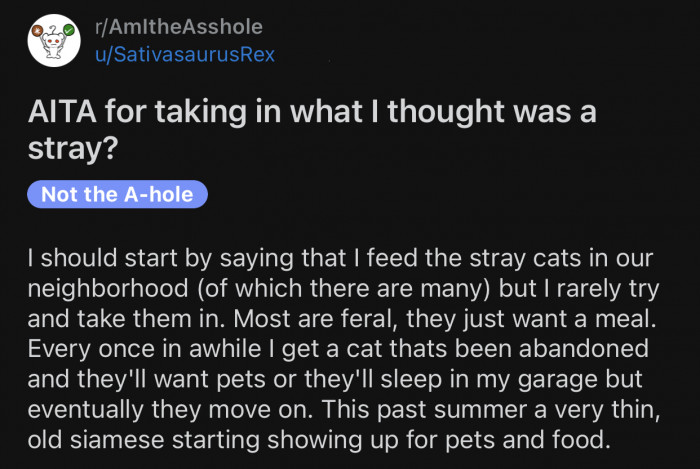
The cat started coming to OP's house more frequently and getting fed and taken care of.

Three weeks after the cat passed, a neighbor from down the street showed up at OP's house.

Ethical Considerations in Animal Rescue
The ethical implications of rescuing animals can be complex and emotionally charged. Research in moral psychology illustrates how individuals often grapple with dilemmas that involve competing values, such as the desire to help versus respect for ownership.
In this case, the neighbor’s decision to take in a seemingly stray cat reflects a compassionate impulse that conflicts with ethical considerations of property rights.
The Psychological Impact of Animal Suffering
Witnessing animal suffering can evoke strong emotional responses, often leading to feelings of guilt or helplessness.
Research shows that empathy toward animals is closely linked to our own emotional well-being, with studies indicating that witnessing distress can trigger significant psychological discomfort.
In this case, the woman's decision to intervene reflects her empathetic nature and a desire to alleviate suffering, showcasing the profound impact of emotional connections to animals.
The neighbor seemed annoyed after hearing the sad news, which made OP doubt the way she handled the situation.

Here's how the Reddit community reacted to u/AllSeeingPineapple's post:

The original owner didn't care about his cat that much.

This conflict may evoke feelings of guilt, especially if the animal's situation deteriorates. Studies show that empathy can compel individuals to act in ways that may not align with legal or ethical norms, often leading to moral distress.
Understanding these emotional drivers can help individuals navigate such complex situations more effectively.
Understanding the motivations behind rescuing animals from perceived neglect is crucial in this scenario.
According to behavioral psychology, individuals often act on impulse in response to emotional triggers, particularly when they identify with the animal's plight.
This instinctual behavior can be rooted in personal experiences of vulnerability or helplessness, driving a strong urge to protect.
The cat recognized OP's place as a safe place to pass away.

He had the option to leave but still decided to stay.

It was neglectful of the owner to let an elderly cat roam around.

The Psychology of Loss and Grief in Animal Care
When animals pass away, the grief experienced can be profound. Research by Dr. Julie Axelrod highlights that the loss of a pet can trigger similar grief responses as losing a human loved one, often leading to feelings of regret and sadness.
This can be particularly relevant in cases where individuals feel they could have done more to help, as seen with the neighbor's experience.
Moral Responsibility and Ethical Considerations
The complexity of moral responsibility in animal care is highlighted in this situation, where the woman felt compelled to act.
Research from the University of Virginia indicates that ethical considerations surrounding animal welfare can create cognitive dissonance, particularly when individuals feel they must choose between their own convenience and the well-being of an animal.
This dissonance often leads to justifying one's actions, which can complicate the decision-making process.
The neighbor has no right to be annoyed.

If it took him a whole month to realize the cat was missing, he was a neglectful owner.

The neighbor is the real a-hole here.

To cope with the loss of a pet or feelings of regret surrounding animal care, experts recommend engaging in grief counseling or support groups.
These resources provide a safe space for individuals to process their emotions and share their experiences, which can be cathartic and healing.
Moreover, honoring the memory of the pet through rituals or memorials can aid in the grieving process.
In many cases, individuals may perceive themselves as moral agents, leading them to take actions they believe are justified.
Studies show that this perception can be influenced by social norms regarding animal care and well-being.
When individuals believe they are acting in the best interest of an animal, they may overlook potential consequences for themselves or others.
You should be thankful that someone made your cat's last days pleasant and lovely.

He never checked on his cat before.

OP has nothing to apologize for.

Community Responsibility and Animal Welfare
Community dynamics play a significant role in animal welfare. Research indicates that communities that prioritize animal care often experience a stronger sense of social cohesion.
In this context, fostering a sense of shared responsibility can help individuals feel more connected and willing to collaborate on animal welfare initiatives.
Encouraging neighbors to participate in discussions about pet care can enhance communal ties and promote ethical behaviors.
Practical Solutions for Compassionate Action
To navigate the complexities of animal rescue, clear guidelines and support systems are essential.
Engaging in discussions about animal welfare practices and community resources can help individuals make informed decisions while considering the broader implications of their actions.
Additionally, training in animal care can empower individuals to act responsibly and compassionately, ensuring the well-being of both animals and their communities.
The cat chose OP over his owner, and that says it all.
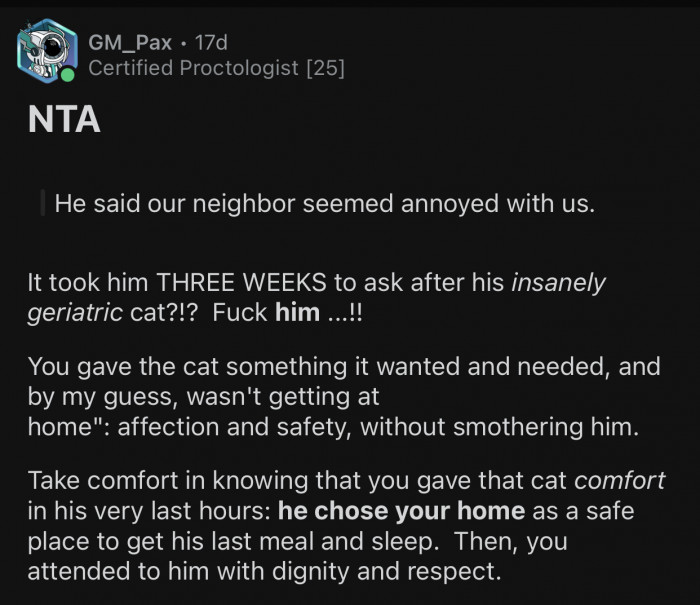
OP did everything as she was supposed to.

The cat knew he was going to die soon.
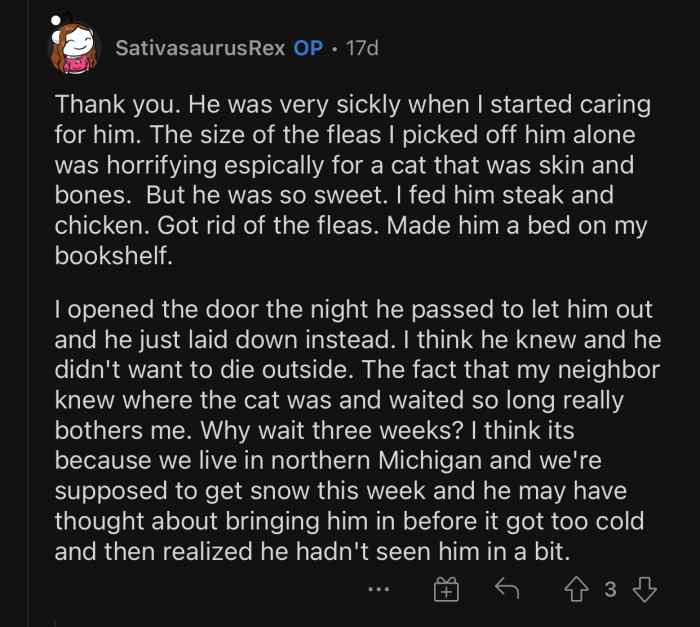
Engaging in community service related to animal welfare can also create opportunities for individuals to connect with others who share similar values and concerns.
This not only benefits the animals involved but also fosters a stronger sense of community and collective responsibility.
Understanding the emotional motivations behind animal rescue efforts can help individuals align their actions with ethical considerations.
Promoting discussions around responsible pet ownership can foster a culture of empathy and compassion in communities.
Ultimately, creating a shared sense of responsibility for animal welfare can lead to positive outcomes for both animals and their caretakers.
The world needs more people like OP.
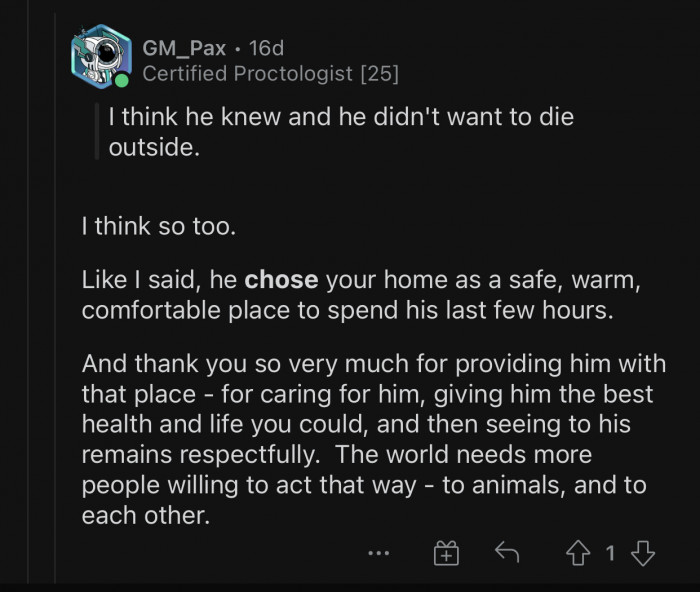
Outdoor cats cause ecological damage.
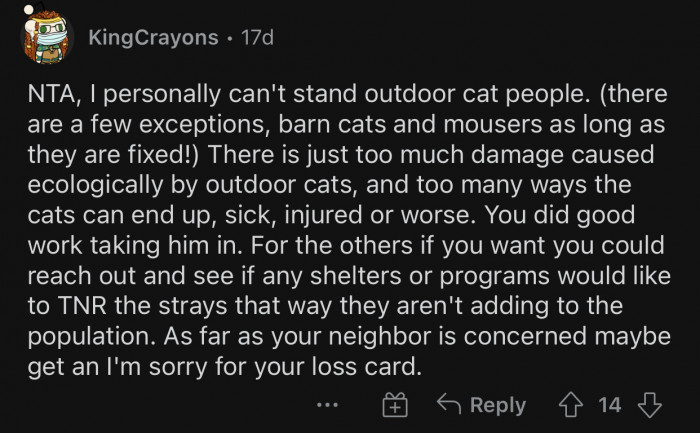
OP made sure the cat's last days were pleasant.
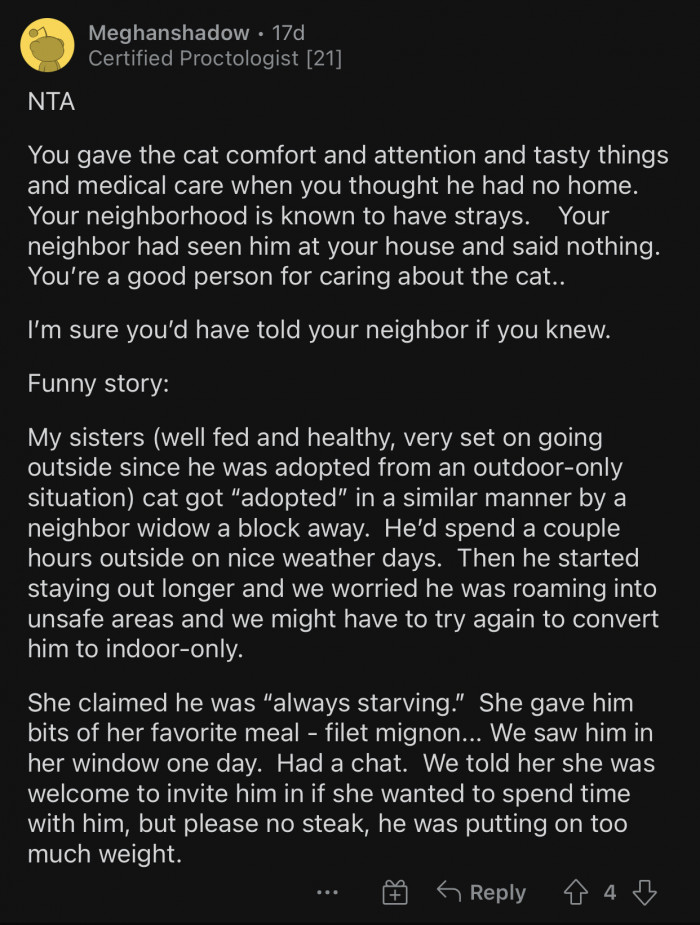
The Emotional Impact of Animal Care Decisions
Every decision made in the context of animal care can have profound emotional consequences. As noted by Dr. Daniel Goleman, an expert in emotional intelligence, "Our emotions are the driving force behind our decisions, especially in situations involving care and compassion." Understanding the emotional weight of these decisions is crucial, particularly when they involve life-and-death situations. In this case, the neighbor’s decision to take in the cat was driven by compassion, but the eventual outcome left him grappling with guilt and sadness.
The Role of Empathy in Animal Welfare Decisions
Empathy is a driving force behind many decisions related to animal welfare, influencing how we respond to situations involving animal suffering.
Research indicates that empathic individuals are more likely to take action when they perceive animals in distress, often leading to interventions.
Fostering empathy through community engagement and education can help build a more compassionate society, ultimately benefiting animal welfare.
The neighbor has no right to complain considering how he is a neglectful cat owner who waited three weeks before realizing something might be wrong with his cat. OP did everything as she was supposed to and should receive a thank you from the neighbor instead of getting annoyed. If you enjoyed this, make sure to check out similar content on our platform.
Psychological Analysis
This situation underscores the profound emotional connections individuals can have with animals, often driving them to intervene in distressing circumstances.
Recognizing these emotional motivations is essential for navigating the complexities of animal welfare responsibilities.
Analysis generated by AI
Analysis & Alternative Approaches
This case highlights the emotional complexities involved in animal rescue and the moral responsibilities that come with it.
Research shows that understanding our emotional triggers and ethical frameworks can guide more compassionate decision-making.
Ultimately, fostering a community-oriented approach to animal welfare can lead to better outcomes for both animals and their caregivers.
Analysis & Alternative Approaches
Navigating the complexities of animal care requires a nuanced understanding of ethical considerations and emotional responses.
Research suggests that community engagement and open discussions can lead to more compassionate and responsible animal welfare practices, benefiting both pets and their owners.



